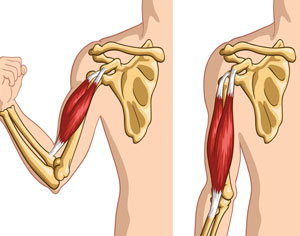Testosterone Function – Its Many Effects on the Body
Testosterone – the word often conjures up images of heavily muscled men pumping iron at the neighborhood gym. A man who comes across as being very manly is said to have high levels of testosterone. Although these images often have a basis in reality, they are far from the real purpose of testosterone in the body. In fact, the many effects of testosterone function often surprise most people, especially women who also need an adequate supply of this vital hormone.
In regards to testosterone production and function, the body synthesizes testosterone from cholesterol. This occurs in a multi-step process that utilizes progesterone as a source hormone for testosterone production. A male’s testes and a female’s ovaries are the leading suppliers of testosterone, with a small portion secreted by the adrenal glands. This is helpful in later years when menopause and andropause change the production of vital hormones such as testosterone.
Testosterone function in the body is divided into a few different areas:
- Physiological
- Physical
- Mental
- Emotional or Psychological
Testosterone affects a person’s mood, libido, mental functions, physical performance, and overall well-being. It is virtually impossible to single out one defining function of testosterone as it plays such a vital role in so many areas of the body. In the next section, we will attempt to hone in on some of the crucial ways that testosterone benefits the body.
Functions of Testosterone
As we have started to discover, there are many important functions of testosterone that help keep the body running smoothly. A decline in testosterone levels is commonly referred to as Low T. What this simply means is that the level of available or free testosterone in the body is lower than what is needed to fuel the necessary functions.
In many ways, testosterone function in males and females are the same. Testosterone provides a body with energy, helps it to sleep soundly, and stimulates sexual responses. Testosterone also impacts the metabolism, bones, and muscles. It can have a profound effect on both heart and mental functions that can have long-term repercussions when a deficiency is left untreated.
We are now going to delve deeper into the various ways in which testosterone benefits the body:
- Reproductive and Sexual Functions of Testosterone
The most commonly heralded testosterone definition and function often have to do with sexual function. Men with Low T often complain about decreased libido, difficulty reaching arousal, may be suffering from erectile dysfunction (inability to maintain an erection, loss of morning erections), reduced power in their orgasms, and a decrease in physical pleasure from sexual intercourse.
Women often find that testosterone levels decline during menopause, and this brings a lack of vaginal lubrication, decreased desire, difficulty becoming aroused, painful intercourse, and reduced pleasure.
- Testosterone and the Central Nervous System
Hormones are chemical messengers that relay their signals throughout the body, including using the central nervous system and brain. It is here, in the hypothalamus, that the message is sent to the pituitary gland to relay production information to the testes. Later, signals will be directed to the hypothalamus as to whether or not more testosterone is needed.
One of the main concerns is that testosterone plays a part in self-esteem, aggression, motivation, sadness, mood, sleep disturbances, and more. Individuals diagnosed with Low T often report feelings of depression, and treatment has been effective at reversing depression and improving overall mood.
- Testosterone and Blood Circulation
Testosterone aids in the production of red blood cells in bone marrow. This can help counteract the effects of anemia often found in the elderly population.
- Muscle, Bone, and Testosterone
Testosterone stimulates crucial growth hormone responses in the pituitary gland that help increase the secretion of insulin growth factor 1 by the liver. In turn, protein synthesis and cellular amino acid uptake in skeletal muscle are increased. Testosterone interacts with DNA nuclear receptors to increase this process, and growth hormone helps to trigger the metabolism of body fat that will be converted into energy used for muscle growth. IGF-1 also helps activate satellite cells to increase muscle growth.
The same basic connection occurs between testosterone, GH, IGF-1, and bone growth. Cellular regeneration of new bone cells relies on all three of these hormones to help prevent osteoporosis – a condition with an increased risk in men and women diagnosed with Low T.
- Testosterone and Heart Health
Testosterone therapy lowers triglyceride and cholesterol levels and improves cardiac capacity and output for better heart health. People can engage in a higher-intensity exercise cycle which is then beneficial for the heart, as well.
- The Brain and Testosterone
Testosterone can lower the production of beta amyloid, a plaque linked to the brain destruction found when Alzheimer’s disease is present. It can prevent the build-up of this plaque rather than having it stored in the brain. Studies on testosterone therapy and brain functions have shown improved testosterone cognitive function results. Improved focus, memory, and mental functions have all been reported following treatment with testosterone therapy.
- Testosterone and Metabolism
Testosterone plays a major role in fat metabolism as it increases lipid oxidation, normalizes glucose utilization, and lowers the risk of developing type 2 diabetes. Studies have shown that older men diagnosed with heart disease, obesity, or diabetes have a higher risk of low testosterone levels. Treatment with testosterone aids in weight loss and lowering these risk factors significantly.
Preserving Testosterone Functions with Testosterone Therapy
The more that you know about testosterone structure and function, the better able you will be to understand a deficiency and how important it is to receive the proper treatment for Low T. Hormone replacement therapy specialists check blood testosterone levels to determine who is deficient and in need of treatment.
Testing testosterone secretion and function with blood analysis is not the only deciding factor. Some individuals will still fall into the lower end of the normal range, but the severity and scope of their symptoms will necessitate treatment for Low T.
Improving testosterone function in females is just as important as with their male counterparts. Although testosterone is viewed as an androgen (sex) hormone, its varied roles can have an impact on physical and emotional well-being. This can adversely affect the overall quality of life on a daily basis.
The proper restoration of testosterone function in males is crucial to more than a good sex life or adequate muscle size. A man’s heart, bones, brain, and more rely on maintaining testosterone levels and functions.
- The many faces of testosterone Jerald Bain Clin Interv Aging. 2007 Dec; 2(4): 567–576. Published online 2007 Dec.
- MedicalNewsToday
- https://pdfs.semanticscholar.org/89b9/ab8225e32a1e67b3c98cf28c312101026a99.pdf





